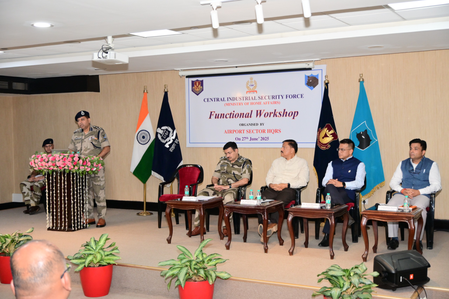

New Delhi, June 28 (IANS) In a major step toward enhancing airport security and improving passenger experience, the Central Industrial Security Force (CISF) hosted a high-level workshop that brought together all key stakeholders in India’s civil aviation ecosystem.
The “Functional Workshop of Airport Sector,” held at the CISF Airport Sector Headquarters on Friday, saw participation from top CISF officials, security heads of 69 airports, and senior representatives from the Ministry of Civil Aviation (MoCA), Directorate General of Civil Aviation (DGCA), Bureau of Civil Aviation Security (BCAS), Airports Authority of India (AAI), Delhi Police, Bureau of Immigration (BOI), Special Protection Group (SPG), National Security Guard (NSG), Delhi International Airport Limited (DIAL), as well as major airlines such as Air India Express and IndiGo.
The workshop focused on making airport security not only more robust but also smarter and more passenger-centric. Here are the key takeaways and how they will benefit different categories of air travellers.
Security checks are set to become more seamless. Discussions focused on integrating biometric entry passes with facial recognition, closed-circuit television (CCTV) systems, Automatic Number Plate Recognition (ANPR), and FASTag integration for vehicles. These measures aim to speed up airport entry and reduce wait times at checkpoints. Digitized Standard Operating Procedures (SOPs) will ensure quicker, more effective responses to any security concerns.
A major focus was placed on “training synergy” among all airport stakeholders. Unified training for airport personnel — from CISF to airline staff — will standardize procedures and create a smoother, more consistent experience for passengers. Plans to set up more Aviation Security Training Institutes (ASTIs) in tier-2 and tier-3 cities will also prepare for rising passenger traffic while maintaining uniform security standards nationwide.
VIP security protocols are being upgraded with an emphasis on layered protection, insider threat mitigation, and advanced anti-drone technologies. These enhancements aim to ensure high-profile individuals travel safely, with minimal disruption to general airport operations.
The workshop also reviewed the Passenger Grievance Redressal Mechanism, with a focus on “balancing customer expectations without compromising security.” Stakeholders agreed on the need for a prompt, humane, and proactive approach to handling complaints. Platforms like AirSewa will be leveraged for real-time feedback and faster resolution.
A key theme was the integration of artificial intelligence (AI) in threat analysis — using predictive analytics to anticipate risks before they materialize. The goal is “mindful use of technology,” resulting in more efficient security checks without compromising safety.
Praveer Ranjan, Special Director General, CISF Airport Sector, called the workshop “timely,” citing evolving global challenges in aviation security. He stressed the importance of continuous knowledge-sharing among agencies.
Vijay Prakash, IG, CISF Airport Sector-I, emphasized the need for “seamless coordination, intelligence-led interventions, and technological integration” to anticipate and manage threats effectively.
DGCA’s Director General, Faiz Ahmed Kidwai, called for deeper collaboration among aviation regulators, operators, and security agencies to create a safe and passenger-friendly ecosystem.
In his concluding remarks, Jose Mohan, IG, CISF Airport Sector-II, stated, “Standardization in aviation security can only be achieved through a shared commitment to innovation, collaboration, and continuous improvement. This workshop is not the conclusion, but the beginning of a coordinated push toward smarter infrastructure, enhanced cooperation, and a more secure and seamless passenger experience.”
–IANS
skp/
